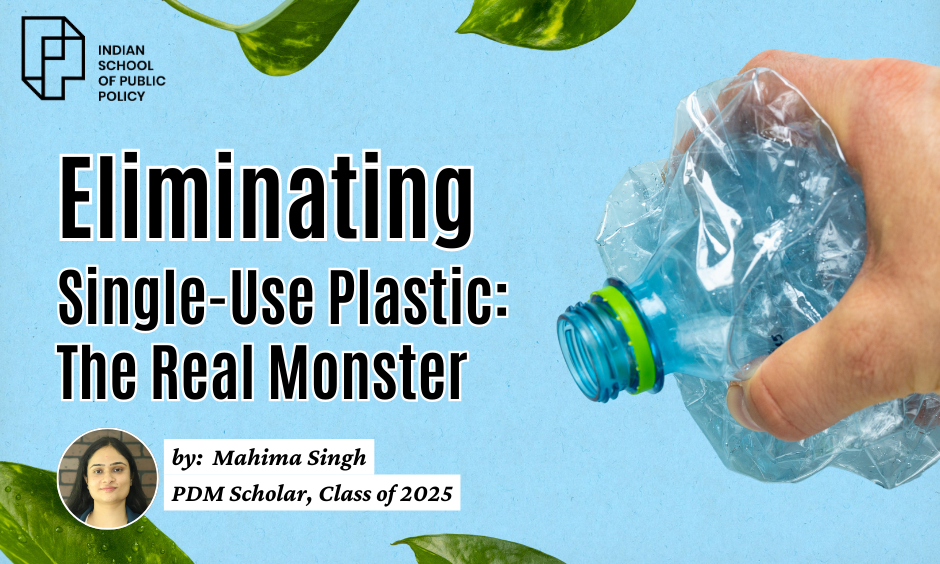
Eliminating Single-Use Plastic: The Real Monster

In the small town of Barabanki, Uttar Pradesh, Ajeet Pratap Singh—a man affectionately known as the “Jhola Man”—has become a local hero in the fight against plastic pollution(HT,2023).While superheroes in fiction battle monsters in society, Ajeet fights the modern-day monster of single-use plastic. For nearly two decades, he has been distributing cloth bags in his community as a symbol of awareness, using his savings to fund the project, and urging people to reduce their reliance on plastic bags. His mission, inspired by a trip to Uttarakhand where he noticed vendors using paper instead of plastic bags, highlights the power of individual action in tackling a global issue.
Single-use plastics have become a convenience-driven habit worldwide, but the environmental costs are staggering. Over 460 million metric tons of plastic are produced every year for use in a wide variety of applications. An estimated 20 million metric tons of plastic litter end up in the environment every year. That amount is expected to increase significantly by 2040. (IUCN,2024)
Many plastic items, like bags, straws, and bottles, are used just once but can take hundreds of years to decompose. This leads to a buildup of plastic pollution that not only damages wildlife habitats but also poses health risks as microplastics enter our food chain.
Government policies, like India’s bans on specific single-use plastic items in various states, are essential steps (Loksabha,2022). But to be truly effective, these policies require strong enforcement and broad public support. Indore’s waste management system is a model for sustainable urban living and waste management, and has been successful in reducing the burden on landfills and improving the environment (Earth5R,2024). Campaigns that raise awareness and encourage everyday practices, such as using reusable bags and containers, can help bridge the gap between policy and action.
While policy changes are important, individuals and communities also play a crucial role in creating change. Like Ajeet’s simple yet impactful approach with cloth bags, we too can adopt small but powerful steps to reduce plastic waste. Using reusable water bottles, carrying metal or bamboo straws, and choosing eco-friendly products are all practical ways to minimise single-use plastic in our daily lives. Supporting companies that prioritise sustainable packaging and reducing our consumption of plastic-wrapped products can push businesses to adopt greener practices.
On the other hand, businesses must explore sustainable packaging options and reduce plastic use across their supply chains. Just like some businesses are already doing, Bigbasket uses recyclable paper and biodegradable bags; Huhtamaki offers molded fiber products; Unilever employs refillable cases and recycled plastics across various product lines. By investing in alternatives like biodegradable packaging, companies can contribute to a circular economy that minimises waste. Consumers have the power to drive this change by choosing products that align with environmentally friendly practices.
As Ajeet Pratap Singh, the Jhola Man, has shown, one person’s commitment to change can inspire an entire community. His mission reminds us that everyone has the potential to contribute to a larger cause. Each cloth bag he distributes helps shift mindsets and habits, one person at a time. If we all take even small steps toward reducing our plastic footprint—whether by carrying a cloth bag or choosing products with sustainable packaging—we collectively move closer to a cleaner and healthier world. Ajeet’s story serves as a reminder that a sustainable future is possible when each of us takes responsibility for our choices, proving that one person can indeed make a difference.
(P.s: Ajeet Pratap Singh is the author’s father)
Register your Interest to Study at ISPP
References –
- Earth5R. (n.d.). Sustainable waste management in Indore: A case study. Retrieved November 18, 2024, from https://earth5r.org/sustainable-waste-management-in-indore-a-case-study/#:~
- =Solutions%20implemented%3A,well%20as%20increased%20recycling%20rates.
- International Union for Conservation of Nature (IUCN). (n.d.). Plastic pollution. IUCN. https://iucn.org/resources/issues-brief/plastic-pollution
- Jaiswal, S. (2023, November 17). Barabanki’s ‘Jhola Man’: Superhero fights plastic pollution with cloth bags. https://www.hindustantimes.com/cities/others/barabankis-jhola-man-superhero-fights-plastic-pollution-with-cloth-bags-101688902836269.html
- Lok Sabha Secretariat. (2022, December 12). Reference note on single-use plastics (No. 12122022_171118_102120463).

Mahima Singh
PDM Scholar, Class of 2025
Mahima Singh is a Public Policy enthusiast who constantly strives to bring about positive change in society and the nation. She has completed her undergraduate and master’s degrees in Political Science and also holds a UGC NET certificate in Political Science.
She has interned with the Government of Uttar Pradesh as a member of the media team for the annually held UP Mango Festival. Additionally, she has worked with Girl Up, a flagship programme of the UN Foundation, which focuses on gender parity, gender justice, and women’s empowerment. She describes Public Policy as the pragmatic and applied aspect of Political Science, which is her area of interest, and she looks forward to pursuing a career in this field.
LinkedIn: https://www.linkedin.com/in/mahima-singh-43a40b202/


